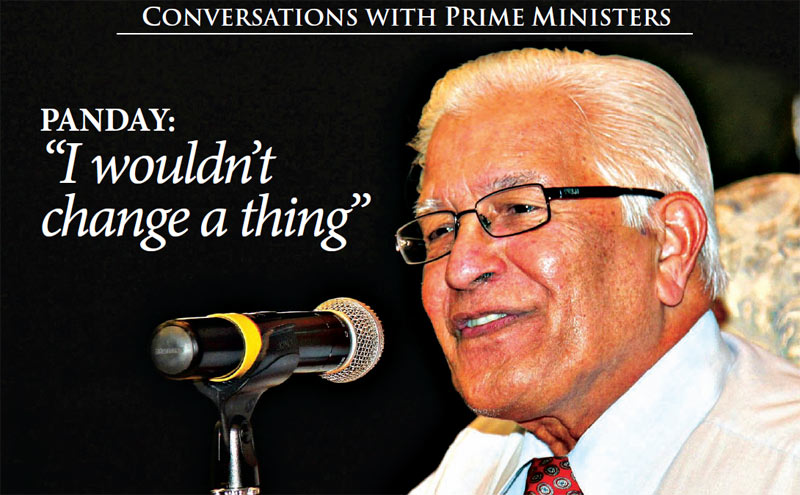|
February 2012

Issue Home >>
|

By Rayna Maharaj
The Daaga Auditorium was quickly filling up this Thursday; an indicator of the popularity of the evening’s featured speaker. It was the second of the lecture series “Conversations with Prime Ministers,” and the man of charisma, wit and drama, Basdeo Panday, was the former Prime Minister who would be on stage.
He had been a Member of Parliament for 36 consecutive years, serving under every Prime Minister Trinidad and Tobago has ever had, except the current.
Beginning his conversation with a brief biographical outline – born in St Julien village on May 25, 1933 to peasant farmers; educated at St Julien C.M. Primary School and Presentation College, going to London in 1957 where he studied for nine years, acquiring a diploma in Drama, a Barrister-at-Law degree from Lincoln’s Inn and a BSc degree from London University in Economics and Government. He was set to pick up a Commonwealth scholarship to do a PhD in India in 1965, when a trip home, and the influence of Stephen Maharaj, altered his life.
He became a politician.
He quickly delved into his political past, describing politics in Trinidad during his time, as “politics of race,” nonetheless, he says, he chose to see the Opposition Leaders and Prime Ministers of his time as “political opponents,” rather than enemies. He identified early influences which made him the man he later became – the manner in which governments were led, an uneventful childhood, hatred for his poor upbringing (he really did not like cleaning mule pens), and an overall desire for a better life. To him, the better life could only come through education, not just for him, but for all. He saw it as his only way out of poverty and made it one of the priorities of his government. He cited the school-building and dollar-for-dollar programmes as evidence of this.
During the late 1980s, with oil being approximately US$15 per barrel, he insisted he was able to manage the demands of the government. Re-emphasizing that every country has limited resources to satisfy unlimited wants, Mr. Panday said this theory of opportunity cost pushed him to form an integrated priority list of objectives: crime, security of the individual, life and property. He said that unemployment was due to the lack of education, in addition to poor investments; and poor investments were in turn caused by lack of infrastructure, such as roads, water and an airport unfit for a country of such stature.
He talked about the complexity of issues and how intertwined problems were, so that they could not be fixed individually but only as a whole. The greatest gift of the country was its diversity, he said, unexpectedly derived from colonialism, yet it was also the greatest curse, as it forced a country to be divided along the lines of race, colour, creed and class. He said it resulted in a constant struggle, leaving nationals to fight for a place regardless of the consequences to others. He insisted that, even as we approach 50 years of independence, we are not yet a nation and this leads to a shameful waste of our most valuable asset: our human resources. He says we have a very long way to go to achieve this goal.
His advice in building a just society is that it must not only be just. Treating people equally is one of the fundamental principles in creating such a society. When asked about the 18-18 tie, when Patrick Manning was chosen as Prime Minister, he laughed.
“It appeared that he [Mr. Robinson] made the wrong choice.”
As per issues of corruption, he advised, “Take it to the courts; act in accordance with the law.” As for the present government, his sentiments were that the money they are spending [on events] should be spent on improving the quality of life. “Publicity hype is not a substitute for performance,” he warned.
As for creating a legacy, he said he is not at liberty to do such, as “history writes your legacy.” He urged citizens to fight for what they believe in. He says he wouldn’t change anything he did as Prime Minister. His objectives remain the same – create a society to make people happy. He says the purpose of life is to be happy.
As for his vision for the future, Mr. Panday said he is hopeful, emotionally and psychologically, that Trinidad and Tobago truly becomes a nation. He believes there needs to be a separation between politics, the party and the government of the day. His advice is to extricate the party from the clutches of government, and put the party in a position where it can address the government and political issues at arm’s length. He is adamant constitutional reform is one of the key elements for Trinidad and Tobago to achieve that goal. His only regret, he says, is that he may not live to see that day. |





